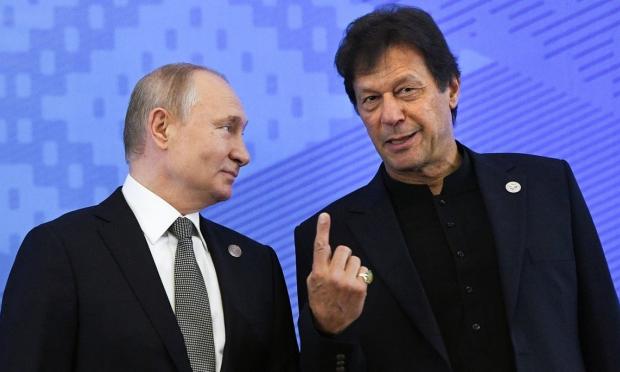What is Russia upto with India and Pakistan? This question is doing rounds in New Delhi and Islamabad since the visit of Foreign Minister Sergey Lavrovto both capitals more than a month ago. Indians appear to be squirming with discomfort while the Pakistanis are rollicking at the triumph of their two-decade long efforts to court Moscow.
President Putin’s close aide, Vyacheslav Nikonov, emphasised in an interview that New Delhi need not take the Islamabad trip too seriously but his advisory has few takers. Because, the Lavrov has signaled that Russians, like the Americans, and to an extent the Chinese, are keen to tap the leverage Pakistan has over the Taliban.
Russian concerns go beyond Afghanistan and encompass its Muslim backyard in Central Asia amidst assessments that after the exit of US forces in September Afghanistan may revert to Taliban-fold. The result, as the Express Tribune (Karachi daily published in partnership with The New York Times) putsis “Putin’s blank cheque” message that Moscow is “open for any cooperation” with Pakistani leadership.
Right now, the most important shared objective is to bring lasting peace to war-torn Afghanistan, says Lahore-based columnist Iftekhar A Khan, who, writing in Daily Times on May 13, made a strong case for Pakistan -Russia – China economic bloc, “especially in view of our strategic location”.
Khan is not alone in such advocacy. Most Pakistani commentators have gone into a state of ecstasy over Sergey Lavrov’s willingness to help in the fields of defence, security and energy. On offer are specialized defence equipment for counter -insurgency operations against anti-state actors. (jihadi groups not aligned with the GHQ in Rawalpindi)
Russia is not a new factor in the Pakistani theatreand Sergey Lavrov’s offer need not disturb sleep in New Delhi.
Moscow had held sway over Pak economy during the seventies when the charismatic Zulfikar Ali Bhutto plunged the country in socialism. A symbol of that era is the Pakistan Steel Mills (PSM); the Russian leader has offered to revivethe white elephantand thus heralded the end of Cold War era suspicions, and distrust in the relations between the two countries.
There is no denying, however, that their bilateral relations have been improving gradually ever since Pakistan joined the post 9/11 war on terror.And over more than a decade, both sides have signed several investment-related memoranda of understanding covering power, railways and coal sectors besides agas pipeline from Karachi to Lahore.
The new rapprochement with Pakistan pops up the question whether Russia, like the United States, till recently, is hyphenating India and Pakistan – to the dismay of the former and to the satisfaction of the latter.
Moscow-based American political analyst, Andrew Korybko, avers that Moscow is “simply balancing” both for its “win-win plan”. It is in accordance with Russia’s grand strategic balancing act, “which forms the core of its envisioned Greater Eurasian Partnership (GEP)”. In his assessment, there can be no question of America like hyphenation for Russia since “India is a much larger market, especially when it comes to energy and military exports”. Korybko – speak deserves attention as he is known to tilt towards Pakistan in his weekly outpourings from Moscow.
Both Korybko and other commentators see in Russian moves a limited cooperation on counter terrorism and under SCO with Pakistan based on ‘independent’ relations. The Russian envoy in Delhi, Nikolay Kardashev has sought to convey the same view but laced it with a denouncement of Indo-Pacific strategy that India believes essential in the face of China’s uninhibited expansionism.
Essentially Moscow’s concern is over Quad and its periscope. The give-away was Kardashev’s gratuitous advice to India - appreciate that China is Russia’s friend, and strategic partner, and India should take into consideration the ‘destabilising activities’ being resorted to by some.
Kardashev – speak also indicates that whatever be its perceptions, Russia will not go beyond a point in ruffling Indian feathers. India is among the few countries buying its missile defence system like S-400. Russia hopes that the state of India’s relations with the United States will prevent Washington from imposing any sanctions on the deal. India thinks likewise.But Russian relations with India and Pakistan cannot be tied to a missile deal.
Pakistan’s duplicitous policy on terrorism is very much in public domain. Its army fights those who attack targets inside the country but allows the state-backed, larger army of non-state actors (jihadis) to needleIndia and Afghanistanfrom its soil. These ‘good’ terrorists are “invaluable” assets and nothing would be done to endanger their presence inside Pakistan.
Pakistan Army is quite ruthless in dealing with anti-state actors (‘bad’ terrorists), attacking them with heavy artillery and jet fighters. And has officially declared victory over them several times.
Russia cannot be so naïve as to think that the military equipment it “gifts” to Pakistan will be used solely against ‘bad’ terrorists. During the Cold War era, Washington used to tell India that its Military Aid program (MAP) to Pakistan was intended to fight the Soviet Union and the ‘occupied forces’ in Afghanistan. Pakistan never displayed such inhibitions. And American merely sported a baffled look.
Wiser from experience, Indians will not buy the Russian baloney that its military hardware to Pakistan is only for counter-terrorism operations. Besides the US, France and other Western nations have been selling weapons to both India and Pakistan. Russian weapons now to Pakistan will not be a big deal.
As a long-time friend, Russia knows that India is neither influenced nor guided by zero-sum outlook in its foreign policy dealings. Also, that it is not worried over the ‘toys’ Pakistan Army acquires. More so after four wars and many more skirmishes. If in doubt, visit the Tank Bund Road in the South Indian city of Hyderabad, and see on display a War Trophy - Patton tank – Americans gave to Pakistan, like giving a chimpanzee an aeroplane!



